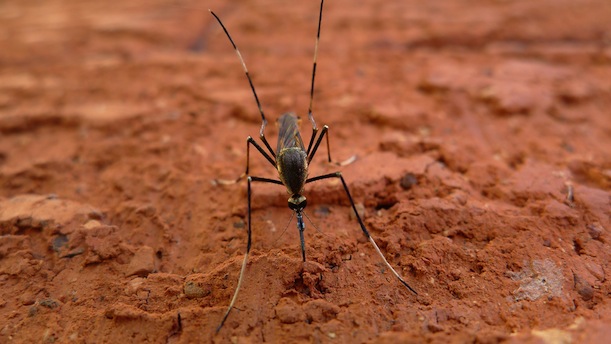This Next-Generation Bug Spray Could Make You Invisible to Mosquitoes
Researchers are analyzing chemicals naturally present on human skin that disrupt mosquitoes’ ability to smell us
/https://tf-cmsv2-smithsonianmag-media.s3.amazonaws.com/filer/mosquito-biting-631.jpg)
Mosquitoes are utterly, stupendously annoying. They can also carry diseases, such as malaria and West Nile virus. Some people—those with type O blood and robust colonies of bacteria on their skin, among other traits—are especially prone to getting bitten by them, and there’s growing evidence that many of the insects are evolving resistance to DEET, the main repellant we’ve relied upon for years.
All of which makes an ongoing project led by Ulrich Bernier, a chemist at the U.S. Department of Agriculture (USDA) Mosquito and Fly Research Unit, especially exciting. He’s taking a new approach to battling mosquitoes: Instead of developing chemicals that repel mosquitoes with unpleasant scents, he’s searching for substances that disrupt their ability to smell in the first place.
And as he announced today at the annual meeting of the American Chemical Society, his group has isolated a few chemicals that are naturally present on human skin in trace quantities and appear to inhibit mosquitoes’ capability to smell and locate humans. If one of these chemicals—mostly likely one called 1-methylpiperzine, which has been the most successful so far—holds up in future tests and can be produced synthetically on a bigger scale, wearing it could be a way of rendering yourself effectively invisible to mosquitoes.

Image via Flickr user John Tann
Conventional insect repellants take advantage of the fact that the creatures rely mainly on their sense of smell to locate humans (they can smell us from as far as 100 feet away). DEET, which was developed during World War II, works mainly because it smells unpleasant to mosquitoes and other insects, so when you wear it, they prefer to fly elsewhere.
But DEET may be gradually growing less effective and has other drawbacks. Some people avoid using it because of evidence that it can, in rare cases, cause central nervous system problems—the EPA found (PDF) that it causes seizures in roughly one out 100 million users.
Researchers are analyzing chemicals that are naturally present on human skin in trace quantities and can disrupt mosquitoes’ ability to smell us. Image via Flickr user John Tann
“We are exploring a different approach, with substances that impair the mosquito’s sense of smell,” Bernier explained in a press statement on his presentation. “If a mosquito can’t sense that dinner is ready, there will be no buzzing, no landing and no bite.”
To find these kinds of substances, he looked back at USDA research that started in the 1990s and was aimed at finding the natural compounds that attracted mosquitoes to human skin. As researchers isolated and analyzed 277 different substances that we naturally secrete in trace quantities, though, they found a handful that seemed to have the opposite effect, making mosquitoes less likely to come near.
Bernier and colleagues have since tested larger quantities of these chemicals to precisely measure their effect on the insects. In a lab, they built a cage divided in half by a screen. One half was filled with a swarm of mosquitoes; in the other half, they sprayed each of the chemicals to see how many of the mosquitoes would try to cross over.
Many of the compounds (most notably 1-methylpiperzine) seemed to inhibit the mosquitoes’ sense of smell, leaving them unable to detect other chemicals they normally find quite appealing. In trials, lactic acid—a substance that occurs in large amounts in sweat—pulled about 90 percent of the mosquitoes toward the screen, but when they mixed in a bit of 1-methylpiperzine, the mosquitoes stayed in place, seemingly unaware of the lactic acid nearby.
The group proceeded to tests with actual human skin and found the same results. “If you put your hand in a cage of mosquitoes where we have released some of these inhibitors, almost all just sit on the back wall and don’t even recognize that the hand is in there,” Bernier said.
He says that these inhibitors induce anosmia (the inability to detect odors) in the insects, making the secretor invisible. As it turns out, some people produce more of these inhibitors than others—which may account for part of why, for example, some people can emerge from an hour outside with bites on every inch of exposed skin, while a friend nearby can come back from the same place entirely unscathed.
The next step is figuring out how to incorporate these chemicals into commercial products. Bernier’s group isn’t the only one analyzing these natural inhibitors, and so far, others have run into a key problem: It’s hard to get the substances to stay on human skin instead of evaporating off, as they naturally do over time. But if they can figure that out and produce insect sprays that inhibit mosquitoes, rather than simply repelling them, all of us may someday be able to enjoy the same benefits as the lucky few who secrete these chemicals naturally.
/https://tf-cmsv2-smithsonianmag-media.s3.amazonaws.com/accounts/headshot/joseph-stromberg-240.jpg)

/https://tf-cmsv2-smithsonianmag-media.s3.amazonaws.com/accounts/headshot/joseph-stromberg-240.jpg)